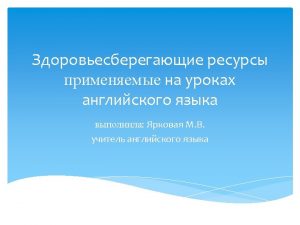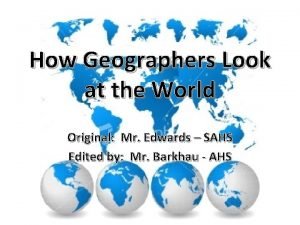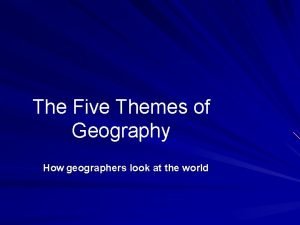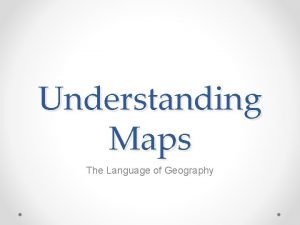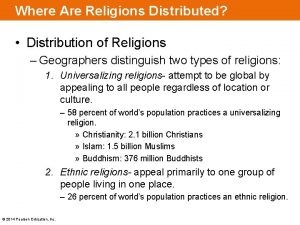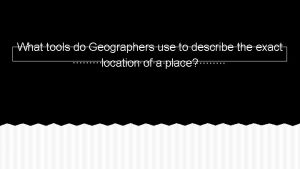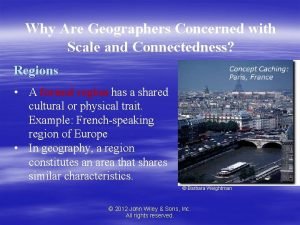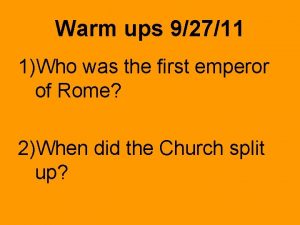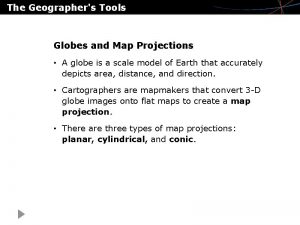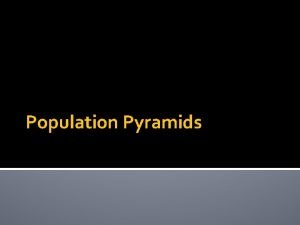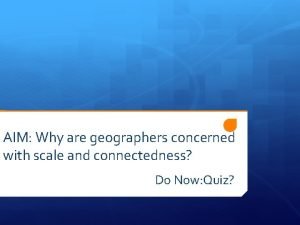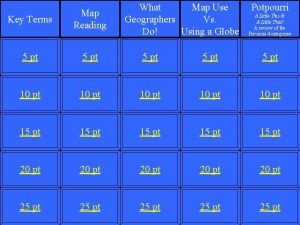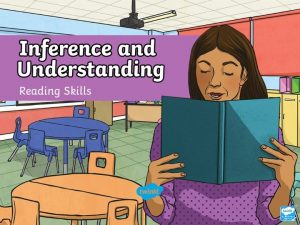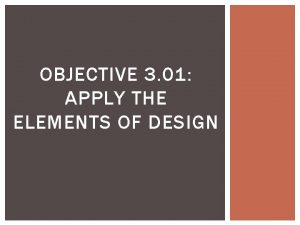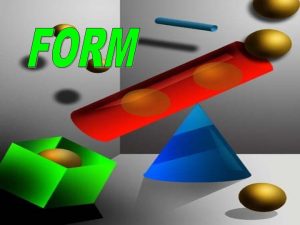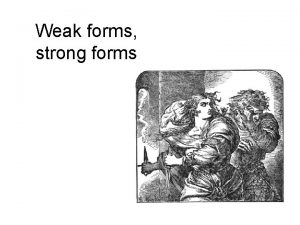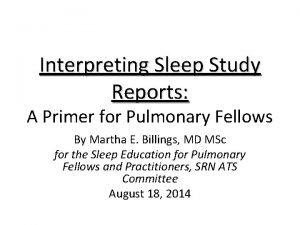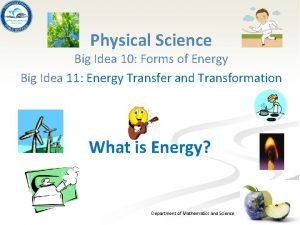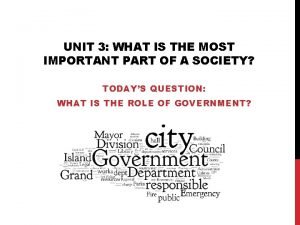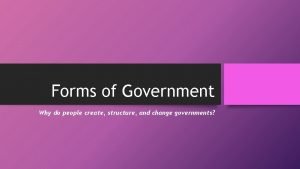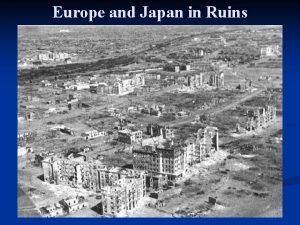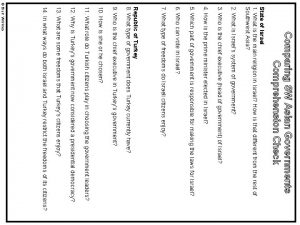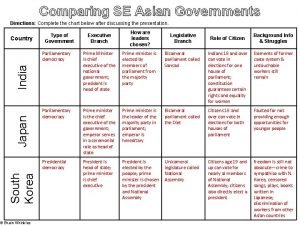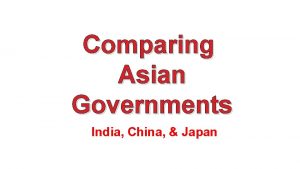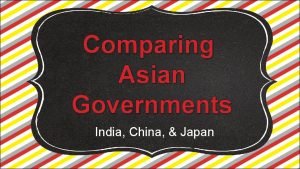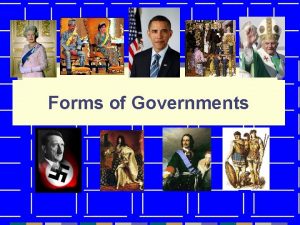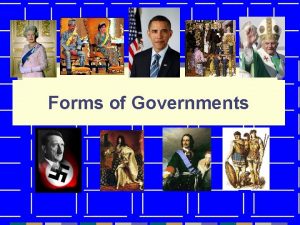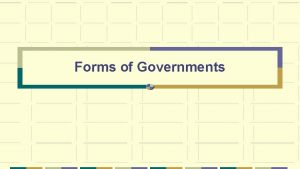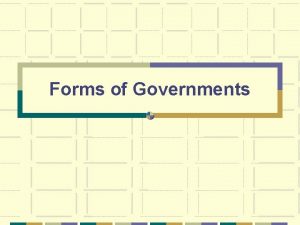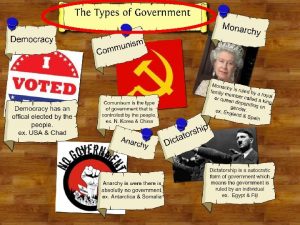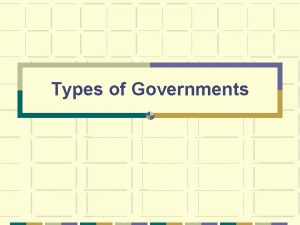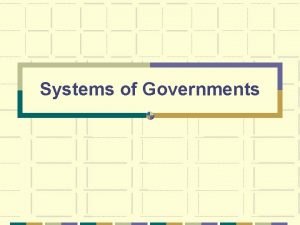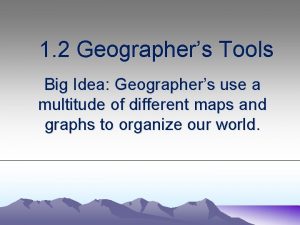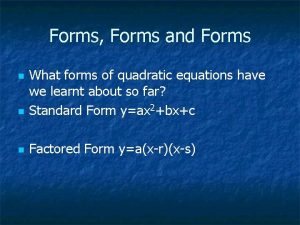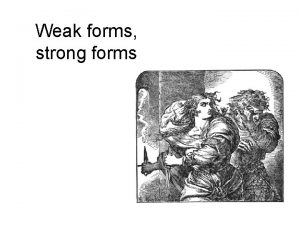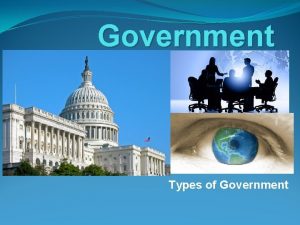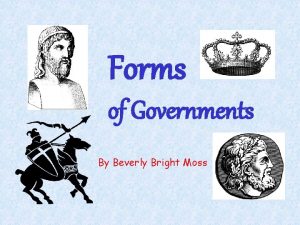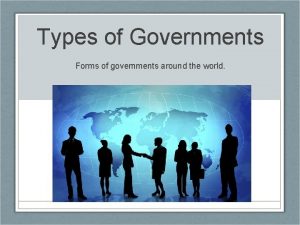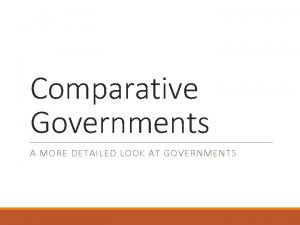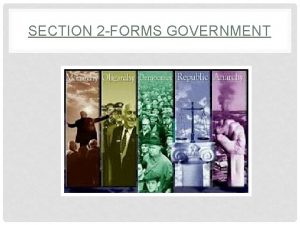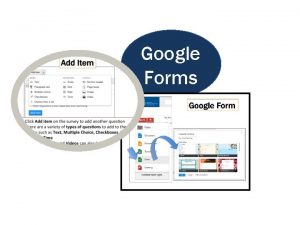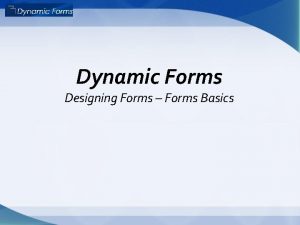Forms of Governments To study governments geographers look




























- Slides: 28

Forms of Governments

To study governments, geographers look at the following: Systems – How the power is distributed. Types – Who rules and who participates. Form- Limited / Unlimited Structure- Leaders role/responsibility

Systems of Government are based on one question: How is the power distributed? There are three ways governments distribute power: Unitary l Confederation l Federal l

Unitary One central government controls everything. Power is not shared between states, counties or provinces. Examples : United Kingdom, France, China, and N. Korea

Confederation A voluntary association of independent states that agrees to follow a weak central government. Nations can choose to follow or not follow the lead of the weak central government. Examples: Greece, Russian Federation.

Federal Power is shared by a powerful central government. States or provinces are given considerable self rule, usually through their own legislatures. Examples: United States, Germany

Types of Government are based on one key question: Who governs and what is the citizen participation? There are three types of governments: l Autocracy, Oligarchy, and Democracy

Autocracy Government in which the power to govern is held by one person. Generally the power to rule is inherited or by military force. Examples: N. Korea, Saudi Arabia, and Libya.

Monarchy One-person rule. King or Queen has total control. Often thought as a divine right to rule that is passed from generation to generation. ADVANTAGES 1. People may be united in their loyalty to a monarch since there is no competition for trust and affection. 2. In an emergency, a monarch can move quickly to take action. No time is lost in debate or discussion. DISADVANTAGES 1. People are often given no individual liberties or civil rights. 2. A monarch’s policies suit his/her own needs. Needs of the people may be neglected. 3. Decision making has a narrow base - can be flawed, wrong, dangerous. No one was willing to tell the emperor what they think of his new clothes…

Dictatorship One-person rule. Ruler has total control. ADVANTAGES 1. People may be united in their loyalty to a dictator since there is no competition for trust and affection. 2. In an emergency, a dictator can move quickly to take action. No time is lost in debate or discussion. DISADVANTAGES 1. People are afforded little or no individual liberty. Civil rights are trampled on. 2. A dictator’s policies suit his/her own needs. Needs of the people may be neglected. 3. Decision making has a narrow base - can be flawed, wrong, dangerous, and not fully supported by the people.

Unlimited Government A government in which no limits are imposed on the ruler’s or ruling parties authority. Also known as Totalitarian.

Oligarchy A government in which a few people such as a dominant clan or clique have power. The group gets their power from either military, wealth or social status. Elections may be held but offer only one candidate. Examples: China, former Soviet Union

Oligarchy Form of government in which the power is in the hands of a few persons or small group (who have the combined power of a dictator. ) ADVANTAGES 1. Decisions can be made relatively quickly. 2. May provide expert leadership while avoiding the danger of one-person rule. 3. In theory, they are the most educated members of society. 4. Members of the oligarchy listen to each other - they work together to rule. DISADVANTAGES Same as Dictatorship (Needs and wants of the people are not necessarily considered. )

Unlimited Government A government in which no limits are imposed on the ruler’s or ruling parties authority. Also known as Totalitarian.

Democratic Governments There are three forms of democratic governments: Direct l Parliamentary l Presidential l Examples: India, Japan, England, USA

Democracy In a Direct Democracy, the government is “Ruled by all of the people” Individual freedom and equality is valued. Free elections are held Decisions are based on majority rule. All voters can express their views freely. Citizens vote by secret / open ballot.

Direct Democracy Government in which all citizens have equal power in decision making. ADVANTAGES 1. Every citizen has equal power in matters of government. Every citizen is involved in the decision making. 2. Since all citizens are involved in decision making, there is a broad base of support and loyalty. 3. Individual liberties are protected. DISADVANTAGES 1. Only works when a small number of people are involved. Ability to gather all citizens in one place is necessary. 2. Decision making involving all citizens is timeconsuming. All citizens give in-put, debate, etc. . .

Representative Democracy Government in which people elect representatives who hold the decision making power. ADVANTAGES 1. Citizens are involved in decision making through their representatives, lobbying, and voting. 2. Representatives are aware their job depends on meeting the needs of their constituents. 3. More likely that all elements of the population are represented. 4. Generally, reps are educated and more-capable citizens who can devote time needed to solve complex problems. DISADVANTAGES 1. Decision making is time consuming. Desire of representatives to please everyone may cripple system. 2. Representatives may not always agree with those they represent. 3. Lack of involved citizenry may allow special interest groups to influence or dominate representatives.

Parliamentary Democracy Prime Minister is elected by legislator There is no set term or limit on how long Prime Minister can hold office Head of the state and the chief executive are two different offices

Parliamentary Democracy Prime Minister is the chief executive and actually is in charge running the government. The President is considered the Head of State and has more of a chief diplomat role with other countries.

Limited Government A government in which everyone, including those in authority, must obey the laws.

Presidential Democracy Voters elect (indirectly) the president. There is a set term on how long President can serve The President is the Chief executive and the head of the state

Limited Government A government in which everyone, including those in authority, must obey the laws.

Similarities between Parliamentary and Presidential Democracy Both have a set of checks and balances Both have freedom for citizens Both allow citizens to vote for legislature representatives Both have bicameral legislature US: House of Representatives & Senate l UK: House of Commons & House of Lords l

Limited Government A government in which everyone, including those in authority, must obey the laws.

Constitutional Monarchy A government with a written plan, or constitution, that includes a monarch as a ceremonial leader and a parliament or other legislature to make the laws. ADVANTAGES 1. Citizens are involved in decision making through their representatives, lobbying, and voting. 2. Representatives are aware their job depends on meeting the needs of their constituents. 3. More likely that all elements of the population are represented. 4. Monarch has almost celebrity status DISADVANTAGES 1. Decision making is time consuming. Desire of representatives to please everyone may cripple system. 2. Representatives may not always agree with those they represent. 3. Lack of involved citizenry may allow special interest groups to influence or with the people. Are not held responsible for unpopular decisions, yet dominate representatives. can help form public opinion

Limited Government A government in which everyone, including those in authority, must obey the laws.

Theocracy A form of government in which God or a deity is recognized as the supreme civil ruler. Often religious institutional representatives (i. e. : a church), replaces or is mixed into the civilian government. Can be an Oligarchy, Representative Democracy, and even a Monarchy.
 Looking down to the left
Looking down to the left 42 wallaby way sydney
42 wallaby way sydney How geographers look at the world worksheet answers
How geographers look at the world worksheet answers Map type
Map type Why do geographers study religion
Why do geographers study religion Geographers tools
Geographers tools Formal vs functional region
Formal vs functional region What was the nomadic lifestyle
What was the nomadic lifestyle Geographers tools
Geographers tools Why do geographers use population pyramids
Why do geographers use population pyramids Why are geographers concerned with scale and connectedness?
Why are geographers concerned with scale and connectedness? What basic questions guide geographers
What basic questions guide geographers Activity 3.picture analysis
Activity 3.picture analysis By looking at the picture from your first activity
By looking at the picture from your first activity Look at the picture in activity 3
Look at the picture in activity 3 Why are related forms more agreeable than unrelated forms?
Why are related forms more agreeable than unrelated forms? Had contracted form
Had contracted form Why are related forms more agreeable than unrelated forms
Why are related forms more agreeable than unrelated forms Why are related forms more agreeable than unrelated forms?
Why are related forms more agreeable than unrelated forms? Strong and weak forms of auxiliary verbs
Strong and weak forms of auxiliary verbs What does a sleep study report look like
What does a sleep study report look like Big ideas 10 and 11 study guide forms of energy answers
Big ideas 10 and 11 study guide forms of energy answers Different kind of governments
Different kind of governments Why do people create structure and change governments
Why do people create structure and change governments Note one way the allies dealt with the holocaust.
Note one way the allies dealt with the holocaust. Comparing sw asian governments comprehension check
Comparing sw asian governments comprehension check Comparing se asian governments
Comparing se asian governments Is japan a unitary state
Is japan a unitary state Comparing asian governments
Comparing asian governments
